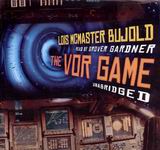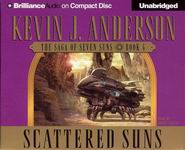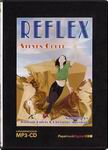
 The Greatest Horror Stories Of The 20th Century
The Greatest Horror Stories Of The 20th Century
Edited by Martin Greenberg; Read by Various Readers
4 Cassettes – Approx. 6 Hours [UNABRIDGED]
Publisher: Dove Audio
Published: 1998
ISBN: 0787117234
Themes: / Horror / Fantasy / Science Fiction / Urban Fantasy / Magic / Curses / Telepathy / Childhood / Demons /
“Featuring some of the masters of the genre, past and present, The Greatest Horror Stories Of The 20th Century are as remarkable for their literary value as for their scream factor. Whether you are a passionate horror lover or a devotee in the making, you will find much to entertain. Listen for screams as ancient and unspeakable evil meets the modern psyche.”
Judicious use of musical cues are the only enhancement to these horror stories. Twelve horrific short stories, to be sure, but are they truly the greatest of the 20th century? Read on, MacDuff….
“The Graveyard Rats” by Henry Kuttner
Read by Michael Gross
A creepy Lovecraftian tale that almost could have been written by H.P. Lovecraft himself. It was first published in Weird Tales’ March 1936 issue. A worthy addition to the list of The Greatest Horror Stories Of The 20th Century list and Michael Gross does a good job with it. And by the way, the R.O.U.S.’s probably don’t really exist.
“Calling Card” by Ramsey Campbell
Read by Juliet Mills
First published in 1982, Ramsey Campbell’s entry in this anthology is more confusing than scary. Juliet Mills is fine but she couldn’t help unravel what we’re supposed to be afraid of. Something about a nice old lady and her mailman delivering a 60-year-old Christmas card?
“Something Had To Be Done” by David Drake
Read by John Aprea
First published in Fantasy & Science Fiction Magazine’s February 1975 issue, this is an excellent Vietnam War era is a freakshow of the ‘coming home in a bodybag story’. It combines the friendly fire and frag stories of that war with the accelerating fear of the supernatural – the tension builds until the closing moment – very similar in tone and quality to Robert R. McCammon’s Nightcrawlers. Reader John Aprea does good work with good material!
“The Viaduct” by Brian Lumley
Read by Roger Rees
“The Viaduct” is a Stephen King-ish tale without the supernatural element – two boys make an enemy of another and come to a sticky end. This is the longest tale in the collection, overly long in my estimation. I was amazed how little content this story has, especially for its length, none of the characters are sympathetic and by the end I was almost rooting for them all to be killed- just as long as it was done soon. Ineffectual because of its length and exploitative and I don’t mean that as an insult, it plays, if it plays at all, on fear without telling us anything about ourselves or anything else. On the other hand Roger Rees’ reading was just fine. “The Viaduct” is in my opinion not up to the standards of some of the stories in this collection.
“Smoke Ghost” by Fritz Leiber
Read by Beverly Garland
An early Fritz Leiber yarn, “Smoke Ghost” posits what a ghost from an urban industrial society would be like, as opposed rattling chains, old bed sheets and creaky haunted houses of the pre-industrial age. Frighteningly well written and very well read. First published in Unknown Magazine’s October 1941 issue.
“Passengers” by Robert Silverberg
Read by William Atherton
William Atherton did a very nice reading of this Hugo Award nominated and Nebula winning short story (1969). “Passengers” is more SF than horror but it is 100% worthy of inclusion. It is about the uninvited guests who wouldn’t leave. These evil aliens have invaded the Earth telepathically and at unpredictable times, seize control of a human mind and force a person to do… things(!). Society has adjusted, but not every individual person will go along with all the conventions humanity has adopted to deal with the “Passengers”. Silverberg’s story examines a relatively small SF theme, stories involving involuntary control of one’s body… think the character of Molly in Neuromancer or the Frederik Pohl and C.M. Kornbluth’s short story Sitting Around the Pool, Soaking Up Some Rays or Robert A. Heinlein’s The Puppet Masters – it is a horror story because it speaks to such a violation of one’s body. Also interesting is the counterfactual raised by the premise – illustrating how difficult it is to determine exactly where the boundary line between free-will and determinism lies.
“Sticks” by Karl Edward Wagner
Read by Patrick MacNee
Set in 1942, “Sticks” is a World Fantasy Award nominated story (1974) that is decidedly Lovecraftian in content and execution. Think Blair Witch Project meets pulp magazine illustrations and you’ll get the idea. Narrator Patrick MacNee does fine work with it too. With all this inspired by Lovecraft storytelling I only wish they’d included some of H.P.’s original prose, but in lieu of that “Sticks” is a good substitute.
“Yours Truly, Jack The Ripper” by Robert Bloch
Read by Robert Forster
First published in Weird Tales’ July 1943 issue “Yours Truly, Jack The Ripper” is actually a better story than it reads now. What seems a mite cliched today was quite fresh in 1943 and this tale was one of the earliest works of fiction to use ‘the ripper redjack’ – something that is relatively common today. Some narrators have a voice that grabs you and won’t let go, Robert Forster is one of them, his range is good, he does a great English accent on this one too – but its his cadence and his gravelly voice that pull me into his orbit every time. Well read and a good yarn.
“The Small Assassin” by Ray Bradbury
Read by Alyssa Bresnahan
Alyssa Bresnahan, professional full time narrator and AudioFile Magazine Golden Voice, does a very good reading of Bradbury’s short story. “The Small Assassin” is about a young couple and their first child; everything would be okay if only the newborn would only accept the world outside the womb. Horror as parenthood – who’d of thunk it? Newly minted parents probably. This tale was previously recorded by Ray Bradbury himself by pioneering audiobooks publisher Caedmon.
“The Words Of Guru” by C.M. Kornbluth
Read by Susan Anspach
Originally published under Kornbluth’s “Kenneth Falconer” pseudonym, in Stirring Science Stories’ June 1941 issue. Well regarded despite its pulpy exposition, “The Words Of Guru” is a genre-crosser full of cosmic demonism and full-tilt weirdness that comes to a thundering crash just minutes after it starts.
“Casting The Runes” by M.R. James
Read by David Warner
I was quite lost listening to this one. I couldn’t tell who was speaking much of the time, this has to do with the fact that many of the characters aren’t given names and the fact that the way this tale was written it would flow far easier on the printed page than it does aurally. In the paper version some names are blanked out (as if censored), David Warner does his best to fill in these gaps which are unreproducable in audio, but ultimately his efforts are unsuccessful. Magic and curses. First published in 1911!
“Coin Of The Realm” by Charles L. Grant
Read by Louise Sorel
Reminiscent in theme of Neil Gaiman’s style of urban fantasy, “Coin Of The Realm” is an interesting tale of the employees of a toll booth on a lonely highway who occasionally collect some very odd coins from the drivers on their road. First published in a 1981 Arkham House collection entitled Tales from the Nightside.
Posted by Jesse Willis

 Travel By Wire
Travel By Wire



 Paladin of Souls
Paladin of Souls